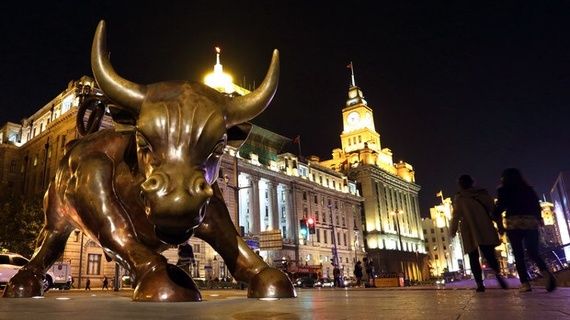Co-authored by William Witenberg a contemporary artist focused on abstract painting
There is no question that sanctions and the decline in oil is hurting the Russian economy. Oil and gas account for 70% of Russia's economy. The ruble's decline has cushioned the effect of the decline in the oil price but Russia is vulnerable to western sanctions and its exposure to the dollar is something Putin is aggressively seeking to diminish.
Interestingly, in three ways the Russian government is trying to delink the ruble and the dollar.
Russia's projected growth of the economy in 2015 will not surpass 1% by even the most optimistic projections. What does Russian leadership do to mend this sinking boat? Russia's Finance Ministry has approved the proposal to increase the volume of ruble settlements on export contracts. In practice, this will mean that all new export, and possibly some revised current, contracts will be concluded with the calculations in rubles. Now settlement mechanism between the EU and Russia is as follows: buyer pays the purchase in euros, bank will convert euros into US dollars, transferred to the account of the exporter, only then local bank will convert dollars into rubles. Soon it will be different: buyer pays in euros, bank converts directly into rubles, bypassing dollar and transfers the amount to the account of the exporter. This new pattern should appeal to many foreign partners in Russia, especially in the EU. There is no need to buy huge amounts of dollars to pay Russia for gas, oil, metals and other commodities. The dollar link is removed.
Russia's joint plans with China, are even bigger. According to Putin, now the annual Russian-Chinese trade turnover is about $ 90 billion. But by 2020 it is planned to increase to $ 200 billion; but without most the transactions having the dollar as a unit of account. The two countries will buy from each other in rubles and yuan. Or - there are plans - to introduce a new international currency. After extensive talks between the governments of China and Russia Deputy Chairman of the Central Bank of Russia Mikhail Sukhov and Assistant to the Chairman of the People's Bank of China Jin Qi signed an agreement on currency swaps for settlement in national currencies. Russian and Chinese banks must use the ruble and yuan in mutual settlements to eliminate the monopoly of the dollar. To date, the Bank of China is the fifth largest state-owned banks in China and is the first Chinese commercial bank, which opened an office in Russia. The use of the ruble and yuan in the calculations will not only reduce Russia's dependence on the fluctuations of the dollar, but will increase the efficiency of conversion operations. In turn, over the past few years, China has done a lot to make yuan global reserve currency. Or at least, to make sure that dollar ceases to being the sole one. Beijing has already managed to create dollar-less currency exchanges with several countries. The list includes Malaysia, Japan, Australia, New Zealand, the United Kingdom, the European Union and now Russia. This linking of the ruble with other currencies can be seen in with transactions between Iran and Russia. The two countries are moving closer to signing a $ 20 billon commodity deal that will help both countries economies to be independent of the Western countries and recent sanctions. According to this five-year memorandum; Russian equipment, machinery and consumer goods are to be supplied to Iran that is currently deprived of any such goods because of the US sanctions. In response, Russia will be transferred Iranian oil, that is now the focus of a western trade embargo. Russian companies will also gain access to participation in projects for the construction and reconstruction of power generation and networks in Iran.
Such an agreement would mean that the entire Iranian oil (except for Iran's "share" and China's share) for the term of the contract will go through Russia. Russia will simply buy all wholesale volumes (in the framework of the agreement on the exchange of technological products or other products covered by US sanctions) and then can sell it to anyone it wants. In huge volumes and at convenient Russia prices. This oil without leaving oil terminals of Iranian port will be shipped directly from there to the traditional customers - but as property held by the contract by Russian Federation.
